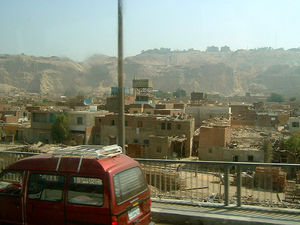Poverty
Consequences Of Poverty

Children who grow up in families with low incomes are significantly more likely to experience a wide range of problems and poor developmental outcomes than children from wealthier families. Greg Duncan from Northwestern University and Jeanne Brooks-Gunn from Columbia University have summarized extensive research findings that substantiate significant associations between poverty and children's health, cognitive development, behavior problems, emotional well being, and problems with school achievement. For example, children from poor families are 1.7 times more likely to be born with low birthweight, 2 times more likely to repeat a grade in school, 2 times more likely to drop out of school, and 3.1 times more likely to have an out-of-wedlock birth than children from nonpoor families. The specific aspects of poverty that are most destructive, as well as the specific outcomes of poverty, vary across different ages and developmental levels. For example, inadequate nutrition is associated with low birthweight, an important measure of well-being for infants that is predictive of later behavior problems and poor school achievement. As another example, the effects of income
One of every five children in the United States lives in a family with income below the official poverty level. Children who grow up in families with low incomes are significantly more likely to experience a wide range of problems and poor developmental outcomes.
When examining the consequences of poverty, it is important to recognize several patterns. First, the effects of poverty are usually nonlinear, meaning that the consequences of income differences below or near poverty levels are substantially greater than comparable differences at higher income levels. Differences in outcomes between children from families living at 50 percent of the poverty level versus 100 percent of the poverty level are large and significant. In contrast, income differences among middle or upper class families make little or no difference for children. Second, persistent poverty can be particularly destructive for children, compared to short-term poverty. For example, Brooks-Gunn and Duncan reported that children who experienced poverty during four to five of their first five years experienced a full nine-point decline in intelligence test scores compared to children who experienced no poverty; fewer years of poverty resulted in a four-point decline in test scores. Third, it is important to recognize that different risk factors (e.g., poverty, father absence, maternal depression, low parental education) are cumulative in their effects. Poor children experience more risks than do nonpoor children. Luthar argued that the effects of poverty are qualitatively different and worse for contemporary children (compared to earlier generations) because of the accumulation of multiple risks in poor families. Finally, it is important to recognize that the effects of poverty can be interactive as well as cumulative. That is, research indicates that poor children are more vulnerable to further negative influences than are children from families with higher incomes. For example, Pamela Klebanov, of Columbia University, and her colleagues found that family risk factors had greater negative effects on infant intelligence for poor children than for nonpoor children.
Poverty influences aspects of children's lives that child development experts have long recognized as essential to normal development. For example, economic stress interferes with positive, high-quality parent-child interactions. As another example, children living in poor families are often socially isolated and/or painfully aware of the shame and stigma associated with poverty. In a research study, the author found that children who most frequently went hungry were also most likely to report that adults criticized or disapproved of them. Child development experts recognize the importance of positive self-esteem to healthy development. Of course, living in a poor family also increases the chances of living in a poor neighborhood with more exposure to violence and less social support for families than in other neighborhoods. Klebanov and her colleagues found that neighborhood poverty had significant effects on children's developmental test scores as early as age three (beyond the effects of family risks and family income). Stressful parent-child relationships, social isolation and shame, and poor neighborhoods are examples of potential mediators or pathways through which poverty produces negative outcomes for children. Researchers have identified a number of other mediators of the effects of poverty on children, including low-quality child care, inadequate health care, the inability to provide a rich and stimulating learning environment in the home, chronic exposure to violence, and poor parental mental health.
Some of the most impressive research findings on childhood poverty come from statistical analyses of large data sets in which pure effects of family income have been isolated from the effects of other factors often associated with poverty (e.g., single parenthood, low parental education). Duncan and Brooks-Gunn and their colleagues demonstrated that family income significantly predicted children's academic achievement and ability, even after removing any predictive power associated with family risk factors that often go along with poverty. Such findings are particularly important in invalidating arguments that poor outcomes for poor children result from other factors besides income level (e.g., character flaws in families, negative effects of welfare, low education levels, single parenting). On the other hand, such an approach to statistical analyses may also represent an unfair or overly rigorous test of whether poverty matters for children. As also noted by Luthar, one will necessarily underestimate the consequences of poverty if one eliminates or ignores any influences of poverty that are also associated with common causes of that poverty (e.g., low parental education, single parenthood). In the real world, poverty naturally coexists with other important family risk factors.
Additional topics
- Poverty - Programs For Children Living In Poverty
- Poverty - Causes Of Poverty
- Other Free Encyclopedias
Social Issues ReferenceChild Development Reference - Vol 6Poverty - Causes Of Poverty, Consequences Of Poverty, Programs For Children Living In Poverty